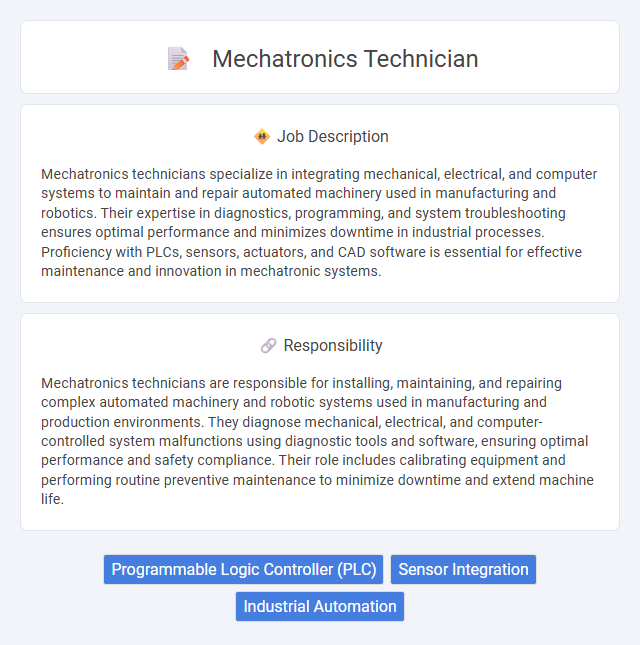
Mechatronics technicians specialize in integrating mechanical, electrical, and computer systems to maintain and repair automated machinery used in manufacturing and robotics. Their expertise in diagnostics, programming, and system troubleshooting ensures optimal performance and minimizes downtime in industrial processes. Proficiency with PLCs, sensors, actuators, and CAD software is essential for effective maintenance and innovation in mechatronic systems.
Individuals who demonstrate strong analytical skills and enjoy working with complex machinery are likely to be well-suited for a mechatronics technician role. Those comfortable with hands-on problem-solving and adapting to technical challenges may find this job fulfilling and engaging. People who prefer routine tasks or have limited interest in electronics and mechanics might find the demands of this profession less compatible with their strengths.
Qualification
A Mechatronics Technician must possess a solid foundation in mechanical engineering, electronics, and computer programming, often demonstrated by a diploma or associate degree in mechatronics or a related field. Proficiency in PLC programming, robotic systems, and troubleshooting automated machinery is essential for effective job performance. Practical experience with CAD software and electrical schematics enhances the technician's ability to design, maintain, and repair complex electromechanical systems efficiently.
Responsibility
Mechatronics technicians are responsible for installing, maintaining, and repairing complex automated machinery and robotic systems used in manufacturing and production environments. They diagnose mechanical, electrical, and computer-controlled system malfunctions using diagnostic tools and software, ensuring optimal performance and safety compliance. Their role includes calibrating equipment and performing routine preventive maintenance to minimize downtime and extend machine life.
Benefit
A Mechatronics technician likely benefits from strong job stability due to high demand in automation and robotics industries. This role probably offers opportunities to work with advanced technology, enhancing skill development and career growth. Competitive salaries and potential for overtime pay may further improve overall compensation.
Challenge
Mechatronics technician roles likely involve complex problem-solving challenges that require adapting to rapidly evolving technologies in mechanical, electrical, and computer systems. They probably encounter unexpected malfunctions or integration issues that demand precise diagnostic skills and innovative solutions. Balancing multiple technical disciplines while troubleshooting may present ongoing difficulties that test both analytical and practical abilities.
Career Advancement
Mechatronics technicians skilled in robotics, automation, and control systems can advance their careers by pursuing certifications in PLC programming and industrial electronics. Gaining expertise in AI integration and Internet of Things (IoT) applications enhances job prospects and eligibility for senior roles. Continuous professional development and hands-on experience with advanced machinery position technicians for management or engineering supervisor positions.
Key Terms
Programmable Logic Controller (PLC)
Mechatronics technicians specializing in Programmable Logic Controllers (PLC) play a crucial role in automating industrial processes by designing, programming, and maintaining PLC systems. Expertise in ladder logic programming, troubleshooting, and integrating sensors and actuators enables efficient control of machinery and enhances production reliability. Proficiency with brands like Allen-Bradley, Siemens, and Schneider Electric is essential for optimizing complex automation systems in manufacturing environments.
Sensor Integration
Mechatronics technicians specializing in sensor integration are essential for assembling, testing, and calibrating sensors within automated systems to ensure precise data acquisition and real-time monitoring. Their expertise includes working with proximity sensors, temperature sensors, and pressure sensors, ensuring seamless communication between hardware components and control systems. Proficiency in sensor calibration and troubleshooting improves system accuracy and operational efficiency, critical for industries like manufacturing and robotics.
Industrial Automation
Mechatronics technicians specializing in industrial automation design, install, and maintain automated systems that streamline manufacturing processes and improve operational efficiency. They work with programmable logic controllers (PLCs), robotics, sensors, and control systems to diagnose faults and implement solutions. Expertise in mechanical, electrical, and computer engineering principles is essential for optimizing production lines and ensuring seamless integration of automated technologies.
 kuljobs.com
kuljobs.com